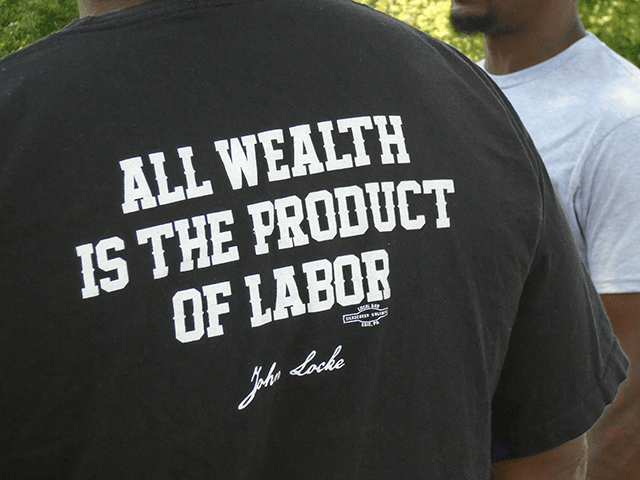
In September we celebrate the Season of Creation and Labor Day. It’s a good time to consider the third goal of Laudato Sí, Ecological Economics.
What do we mean by Ecological Economics? Basically, it’s a clear reminder that everything is connected – nothing can function as being independent of, superior to, anything else. This is true of economics and economic systems as well.
We read in Laudato Sí:
#138 Ecology studies the relationship between living organisms and the environment in which they develop.
#139 When we speak of the “environment,” what we really mean is a relationship existing between nature and the society which lives in it.
#141 …. This suggests the need for an “economic ecology” capable of appealing to a broader vision of reality. The protection of the environment is in fact “an integral part of the development process and cannot be considered in isolation from it.”
Yet, this is not our experience.
Elizabeth Garlow of the Francesco Collaborative, writes: "Today’s mainstream economics, through its emphasis on growth and efficiency, continues to legitimize rapid ecological change and resource extraction from communities, particularly those who are most vulnerable. By concentrating wealth and power in the hands of shareholder-owners, communities are not empowered to develop, resource and build their own vision for the future. Often, investments bring more benefit to investors than to the communities they supposedly support."
She continues, "While the dominant paradigm has positioned an elite subset of the private sector as primary stewards of our economy, ecological economics recognizes that we are all responsible for the ways we live, how we provide for our needs, what we purchase, and how we manage our financial and other resources."
As we read Laudato Sí it is clear that the purpose of the economy is to support the flourishing of all people. It exists to serve the common good. It is to be attentive to the quality of life for all people. (Joshua Farley, ecological economist and Professor in Community Development & Applied Economics and Public Administration )
What does all this mean? What is needed to help achieve an ecological economics envisioned by Pope Francis?
Suggestions offered in resource material from the Laudato Sí Platform Committee include: Sustainable production and consumption; Ethical investments; Divestment from fossil fuels and any activity harmful to the planet and the people; Supporting circular economies; Prioritizing care labor; Protecting the dignity of workers.
Let’s consider more closely three of these.
“Circular economies” are those economies that are rooted in recycled, sustainable practices. They develop processes and use products that have been recycled. Have you heard of the fibers of garments/clothing that are made from food wastes? Surely you’ve seen – and hopefully used – paper made from other, recycled, paper. Or glass bottles being smashed and processed into sand. There is progress in what is already happening. Much more is possible. We need to find and support efforts to do this, however simple they are.
Summer provides multiple opportunities to encounter local attempts to foster circular economies. Take an interest in the small farms in your area. Support the vegetable and fruit stands along the road. Roam through the farmers’ market in your town; purchase some fruits and vegetables, herbs, flowers. Create relationships with your local farmers and gardeners. Support them. Consider buying into a food co-op. Relationship at all levels, in all forms, is key to ecological economics.
Who provides “care labor”? Think of our essential workers: child care workers, nurse aids, emergency attendants, hospice workers, restaurant servers, grocery store check-out personnel….. How can we recognize the value of “care labor”? We can interact with them with respect and gratitude. We can advocate on their behalf for just and fair compensation for their work.
Every September we celebrate Labor Day. This day invites us to remember the church’s history of supporting workers. From 1891, when Pope Leo XIII wrote the encyclical Rerum Novarum, continuing to the present, all popes spoke of the value and dignity of work and of the workers. (See #124-129 in Laudato Sí)
In 1891 Pope Leo wrote that the church recognizes that the lack of workers' unions contributed to an unjust situation where many work in conditions little better than slavery. Today, the weakness of labor unions has often been noted as one factor contributing to the overwhelming power of corporations to dominate local economies, the workforce, and the environment for their own advantage. This is about ecological economy.
Labor Day is a day we remember the many ways workers have contributed to the strength of our country. It invites us to remember the small, locally owned businesses in our area. How can you support them more fully so they can continue to offer an alternative – an ecological economy?
September: A good time to celebrate Ecological Economics.
Suggested actions:
—Practice the Six R’s
- Refuse
- Reduce
- Re-use
- Re-purpose
- Recycle
- Reverence
—Volunteer for membership on a committee in your neighborhood.
—When reviewing your financial investments ask directly whether they are socially responsible investments.
